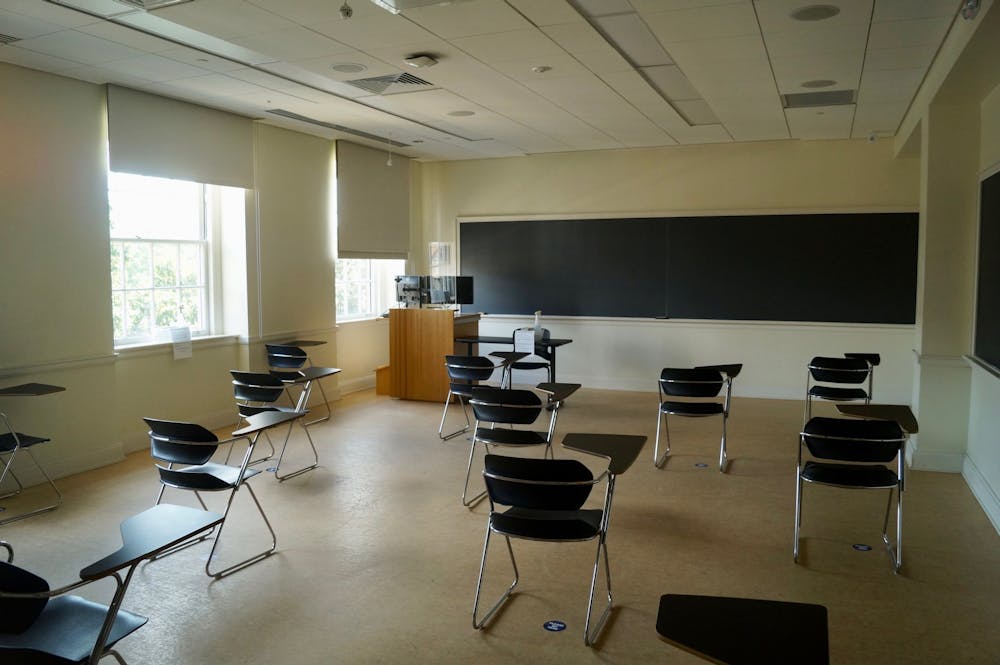Sex education is an awkward topic for a lot of Americans — its a subject that parents, schools, teachers and even most kids do not want to talk about at home or in the classroom. But sex education is more than just gym teachers sticking condoms on bananas — it’s also an opportunity for youth to learn about sexuality, gender identity, healthy relationships and consent. Importantly, it can provide LGBTQ+ youth with critical health information that they may struggle to get otherwise, and helps to dispel myths and prejudices from non-LGBTQ+ students who hear the content. Thus, Virginia ought to mandate that all public schools in the Commonwealth provide students with comprehensive sex education that is LGBTQ+ inclusive.
Unfortunately, the state of sex education in Virginia today is far from ideal. Virginia does not mandate sex education, which means individual schools are free to decide whether or not they even want to offer it, and given free reign to craft the curricula that are used.
As a result, kids in schools that choose not to offer comprehensive sex education miss out on its benefits, and suffer worse health outcomes as a direct consequence. For all students, sex education has been found to reduce transmission of sexually transmitted infections and improve sexual health outcomes in general. By contrast, abstinence-only sex education has been proven ineffective and does not accomplish either. For this reason alone, it’s worth it for Virginia to mandate comprehensive sex education.
However, sex education has unique benefits for LGBTQ+ youth in particular. This is in part because LGBTQ+ youth are so often stigmatized by their peers, educators and even families, and therefore may not have anyone to turn to with questions regarding their sexual health.
Students in Virginia are acutely affected by this information shortage. According to a survey conducted by the Centers for Disease Control and Prevention, only 45 percent of secondary schoolers were taught about sexual orientation, and just 36 percent of those in 6th through 8th grade received such instruction. Barely over half of secondary schoolers received teaching in gender identity and expression, and around 40 percent of those in 6th through 8th grade reported the same. When it comes to education on STI or pregnancy that is inclusive of LGBTQ+ people, just 42 percent of secondary schoolers received this information.
The lack of information leads to personal anguish and stress for LGBTQ+ students that are struggling to understand themselves, which leads in turn to more health challenges. Research has found that a lack of sexual health education is a direct cause of negative health effects suffered by LGBTQ+ youth.
These worsened health outcomes constitute a number of health disparities that LGBTQ+ people face, all of which could be reduced with proper sex education. LGBTQ+ people account for more than two thirds of new HIV infections, are more likely to contract an STI, are more likely to become pregnant and face a higher risk of both coerced sexual contact and dating violence. These are issues are the bread and butter of what a comprehensive sex education would work against and demonstrate why it must be LGBTQinclusive.
LGBTQ+ students also face major disparities in their mental health caused in large part by intolerance and lack of acceptance. LGBTQ+ youth are more likely to experience bullying, feel sad or hopeless, use illicit drugs and both consider and attempt suicide. While this might seem outside the wheelhouse of what sex education is capable of, research has found that LGBTQ+ inclusive sex education curicula help to create a more respectful environment for LGBTQ+ youth at school, and foster greater acceptance that reduces the root causes of these mental health disparities.
It is for these reasons that Virginia needs to mandate all schools provide students with comprehensive sex education, and that it be taught with an LGBTQ+ inclusive curriculum.
Of course, some may dispute that sex education alone has that big of an effect. After all, the internet exists, and with it, answers to any sexual health questions that may come to mind. And it’s true, LGBTQ+ youth have been found to search for health and medical information at a rate nearly twice their non-LGBTQ+ peers. Unfortunately, they are also more likely to be misinformed by the information they find. So despite the internet, a vetted, LGBTQ+ inclusive sex education curriculum would provide a service that Google cannot.
Other critics of LGBTQ+ inclusive sex may not be comfortable with the idea of schools talking about the subjects of sexual orientation and gender identity, fearing it to be an inappropriate subject or a violation of some moral or religious creed. Some have gone so far as to describe the notion of LGBTQ+ inclusive curricula as gay propaganda.
But the truth is that LGBTQ+ students exist in every city and county in the Commonwealth, and frankly it does not matter what sex education class they get or what their parents think about their identity for them to exist. What matters instead is the fact that they may go without important health information — the lack of which results in real health disparities that cost people their lives. Given these stakes, it is clear that now is the time for Virginia to mandate comprehensive, LGBTQ+ inclusive sex education in public schools to finally rectify these significant health disparities.
Matt Heller is an Opinion Columnist for The Cavalier Daily. He can be reached at opinion@cavalierdaily.com.
The opinions expressed in this column are not necessarily those of The Cavalier Daily. Columns represent the views of the authors alone.







